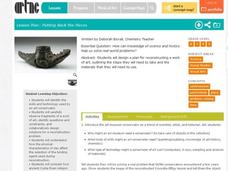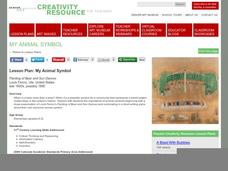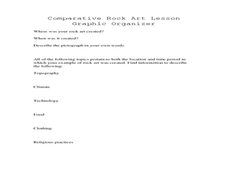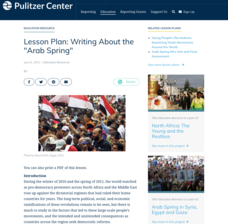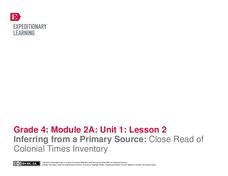Curated OER
Putting Back the Pieces
Seventh graders become museum conservators and undertake the hypothetical restoration of an ancient American work of art. Groups design a plan for reconstructing the work of art, outlining the steps they need to take and the materials...
Indian Land Tenure Foundation
Relationships to Places
Young historians take a look at how the Indian tribes of California promoted a mindful relationship between people and the land. They begin to understand how the Indians were champions of conservation, and at preserving the natural...
Denver Art Museum
My Animal Symbol
Here is an art lesson that combines visual arts and language arts into one very nice package. In it, youngsters study a fascinating painting called Painting of Bear and Sun Dances. They begin to understand the importance of traditional...
Curated OER
Writing Exercises: Economic and Social Revolutions III
With great advancements come great changes! Young historians examine economic and social change occurring after the start of the Industrial Revolution. They respond to three questions regarding the beginning of the Revolution, the impact...
Curated OER
Whispers of Angels: Buffalo and the Underground Railroad
What role did Buffalo, New York play in the Underground Railroad? Young historians investigate the Underground Railroad ties to Buffalo and western New York. They create a web site or multimedia presentation based on the research. If...
Curated OER
Letter Writing
Keep the art of letter writing alive in this age of Tweet and Twitter! The 10 activities detailed in this resource lead pupils through the process of crafting classic forms. A list of and links to famous letters is also included as part...
Curated OER
King Tut On The Move
Students read a story called King Tut On the Move and answer vocabulary and comprehension questions about it. In this current events King Tut lesson plan, students respond to literature by answering questions, recalling details, sharing...
Houghton Mifflin Harcourt
Renaissance and Reformation Writing for the SAT
Responding to a question on the Machiavellian principle of a ruler's need for power and ruthlessness, young historians are given writing tips and a framework for constructing a well-developed essay in 25 minutes. The given structure of...
K5 Learning
Musical Instruments to Play
Bring some music to your language arts lesson with a reading comprehension activity. Learners read an informational passage about different musical instruments before answering a series of comprehension and vocabulary questions.
Denver Art Museum
Lesson: High Prestige and Status
Prestige and status have been symbolized in many different ways throughout human history. Young art historians analyze an ancient Panamanian medallion for symbols of prestige and status, and then generate a list of other symbols of...
Curated OER
Rock Art Around the World
Pupils analyze rock art. In this rock art lesson plan, students research cultures that created rock art, analyze their art pieces, and compose essays regarding their findings.
Curated OER
Arkansas Civil War Bandits and Outlaws
Young historians study civilian Arkansas during the Civil War. They look at the many challenges they faced to keep their homes in order while the men were at war. Learners hear stories of bands of outlaws who ravaged the state during...
Curated OER
African Americans in the Civil War
Students examine the contributions of African American soldiers during the Civil War. In pairs, they complete Civil War timeline worksheets. They use character cards to assume the identities of African Americans and determine whether or...
Curated OER
Lessons from the Holocaust
In an ultimate instructional activity about listening to opposing points of view, your young historians read testimony from the Nuremberg Trials by Nazi SS officers regarding their actions during the Holocaust and a brief speech by...
Curated OER
American Flag History
Young historians explore US culture by investigating the US flag. They will use their textbooks, prior knowledge, and sources provided by the teacher to research the history of the American flag. They will design and create a trading...
Curated OER
Introducing Vocabulary: Christopher Columbus (Weinberger)
The story of Christopher Columbus has fascinated young historians for centuries; use this vocabulary-in-context strategy to dive into Kimberly Weinberger's picture book about this classic explorer. Begin by introducing the new words:...
Curated OER
Anti-Semitism Workshop
Originating from the Yad Vashem Holocaust Memorial Museum in Jerusalem, here is a resource to support your world historians in their study of World War II, the Holocaust, your cultural scholars learning about anti-semitism, or your...
Pulitzer Center
Writing About the "Arab Spring"
An information-rich resource, this webpage will provide your class with all the information they need to explore a relevant real-world and little understood topic: the Middle East and the people's revolutions that shook it in the spring...
EngageNY
Inferring from a Primary Source: Close Read of Colonial Times Inventory
Teach your class about colonial America through an examination of primary documents. First though, start vocabulary notebooks for content-specific and academic vocabulary. Pupils can keep this record during the entire module. Once this...
Curated OER
Introduction to Age of Absolutism
Who were the absolute monarchs of Europe and what effect did they have on their countries? Young historians begin by naming qualities they believe are important for a monarch to possess. They then take notes on four key factors leading...
K12 Reader
My "Uninvention"
Is there anything in the world you wish could be "un-invented"? If so, why would the world be a better place if your choice did not exist? Your young writers and historians will be excited to respond to this writing prompt and share...
K12 Reader
The Greatest President
Who is the greatest US president? George Washington? Abraham Lincoln? FDR? Find out the opinions of your young historians with this cross-curricular writing prompt that engages them in researching the accomplishments of these influential...
Read Works
Columbus Reports on His First Voyage, 1493
What did Christopher Columbus have to say about his exploration of the Caribbean? Young historians have a chance to examine Columbus' own words about his voyage to Cuba and Santo Domingo. After reading Columbus' report, pupils respond to...
Literacy Design Collaborative
Elie Wiesel's Acceptance Speech Analysis
Elie Wiesel's Nobel Prize Acceptance speech provides young historians with an opportunity to demonstrate their ability to use evidence from the speech. They work together to analyze how Wiesel uses rhetorical devices and syntax to...


